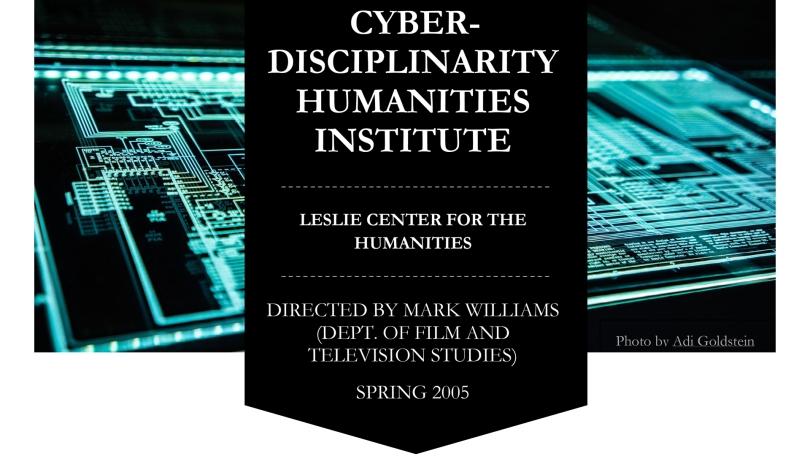
- Undergraduate
- Off-Campus Programs
- Student Work
- Diversity
- News & Events
- People
Back to Top Nav
Back to Top Nav
Back to Top Nav
Back to Top Nav
Back to Top Nav
This Humanities Institute at Dartmouth College, foundational to Digital Humanities at Dartmouth, was directed by Mark Williams, Associate Professor and Chair of the Department of Film and Television Studies.
Cyber-Disciplinarity Humanities Institute
April 2005
Leslie Center for the Humanities
Dartmouth College
Humanities Institute directed by Prof. Mark Williams (Dept of Film and Television Studies)
This Humanities Institute at Dartmouth College, foundational to Digital Humanities at Dartmouth, was directed by Mark Williams, Associate Professor and Chair of the Department of Film and Television Studies. The assembled scholars met weekly to share their relevant scholarship and also organized two conferences in order to initiate a trans-disciplinary survey of critical issues attendant to the rise of cyber-culture.
(Both conference events can be watched here.)
In particular, we considered the effects of cyber-culture on "discipline," in terms of both specific disciplines of knowledge and broader modes of social surveillance. The rise of cyber-culture and new media presents significant challenges and opportunities to academic disciplines, within and beyond the Humanities. Technologies such as personal computers, digital databases, and the internet continue to transform how scholars research, teach, and publish.
For some scholars, their very object of study has been altered. For still others, cyber-culture has afforded innovations in methodology, collaboration, and practical application. Beyond these developments, cyber-culture also includes broad cultural and social transformations, from changes in work patterns and entertainment forms to the rise of global commerce and new definitions of the nation-state. For many, these changes index the emergence of a new form of global surveillance and power. For this truly inter-disciplinary Humanities Institute, we assembled 26 artists, scholars, and public intellectuals to investigate these issues together in considerable detail.